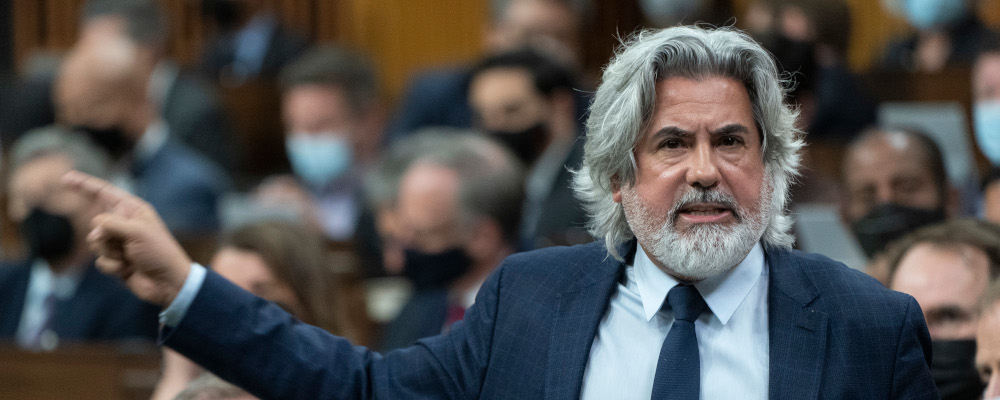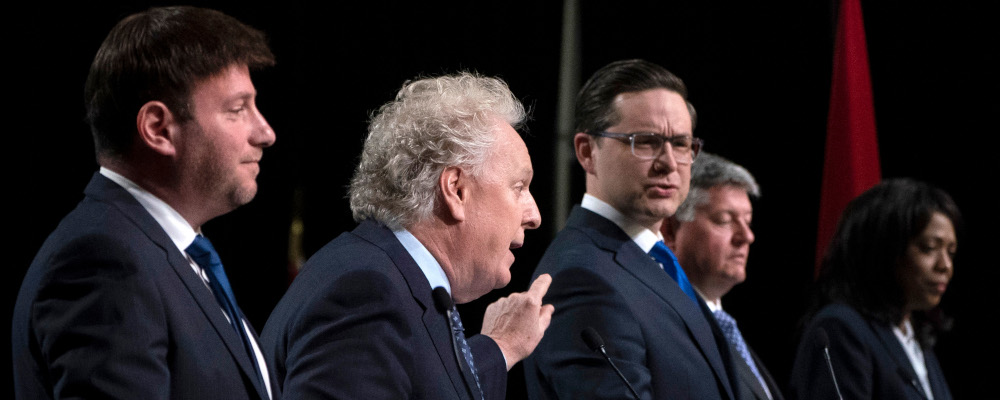Already famous for cracking down on dissent, Canada is poised to become a global leader in restricting online speech and meddling with news media.
Prime Minister Justin Trudeau’s government gained fame this winter when protestors opposed to COVID-19 restrictions took over the streets of the nation’s capital. Ottawa police were unable to cope with what became an entrenched, irritating, noisy but largely peaceful protest involving a great many big rig trucks. And lots of honking. In response, the Trudeau government used the Emergencies ActWith the Emergencies Act invoked, we wait to see how the sledgehammer hits the peanut—giving it powers designed for wartime—to disperse the protestors.“Trudeau named Justice Paul S. Rouleau to lead the Public Order Emergency Commission, which will ‘examine the circumstances that led to the declaration being issued and the measures taken in response to the emergency.'” https://www.politico.com/news/2022/04/25/canada-emergency-laws-inquiry-trucker-convoy-00027520 Assertions of a seditious white-supremacist-led insurrection have to date proven unfounded, no weapons were found, and the government is still struggling to explain why it had to take such drastic action.
Unrepentant and undeterred, Trudeau and his Heritage Minister, Pablo Rodriguez, are moving forward with a buffet of speech and media legislation.
The Online Streaming Act places the internet under the authority of the Broadcasting Act and Canadian Radio-television and Telecommunications Commission (CRTC), which is best known for enforcing mandated levels of Canadian content (Cancon) and ensuring that which it governs is “of good standard.”“On February 2, 2022, the Government of Canada introduced the Online Streaming Act to update the Broadcasting Act for today’s digital world. The legislation clarifies that online streaming services fall under the Broadcasting Act and ensures that the CRTC has the proper tools to put in place a modern and flexible regulatory framework for broadcasting. These tools include the ability to make rules, gather information, and assign penalties for non-compliance.” https://www.canada.ca/en/canadian-heritage/services/modernization-broadcasting-act.html Rodriguez says the aim is to make streaming companies such as Netflix, Disney Plus, Pornhub, and Amazon Prime pay into funds used to make Canadian films and television programs. But the legislation gives the CRTC powers far more sweeping than those that are necessary to achieve those relatively straightforward goals. The regulator will not only get money for the funds, but it will also be expected to force YouTube et al. to give priority to approved content as well as governing TikTok, podcasts, and social media posts. The impact on consumer freedom, preferred speech, online creators, and what has been a flourishing film and television sector fuelled by foreign investment is expected to be significant.
Next up is the Online News Act, which forces American companies such as Facebook, Google, LinkedIn, etc to make payments to Canada’s struggling news industry, which insists it should be compensated for the value its posts add to social media.“Today, the Minister of Canadian Heritage, Pablo Rodriguez, introduced Bill C-18, the Online News Act, which would establish a new legislative and regulatory framework to ensure fairness in the Canadian digital news marketplace and for independent local news businesses, including rural and remote news organizations, by ensuring that news media and journalists receive fair compensation for their work.” https://www.canada.ca/en/canadian-heritage/news/2022/04/government-introduces-a-bill-to-ensure-fair-compensation-for-news-media-and-the-sustainability-of-local-news.html Facebook and the others believe the value they provide to news organizations (free access to billions of eyeballs) is much greater than any they receive but, regardless, Trudeau’s government is anxious to send revenue the publishers’ way. In doing so, it has again gone over the top. Despite the fact the Supreme Court of Canada has ruled that hyperlinks do not have a commercial value, Bill C-18 nevertheless insists that they do—something no other country has done.
The overreach doesn’t end there: the money comes with catches. Newsrooms wishing to benefit must be approved by a government-appointed panel that assesses applicants’ bona fides and also approves which media may (or in the case of Rebel News who may not) qualify for a tax credit which is not to be confused with another panel that doles out funds to pay reporters on panel-approved beats. (This year, one of those beats involves enhanced coverage of the Trudeau government’s presence in British Columbia). A digression, for sure, but one that fills out the picture.
The Online News Act also makes the CRTC responsible for appointing arbitrators when needed and approving agreements that must detail how newsrooms spend the dollars they obtain. According to the Act, the money must be spent on coverage that is local, regional, or national—yet another unnecessary intrusion. After all, if the agreements to be reached are truly commercial, what business is it of the government how news organizations spend the money? The chill created by government involvement in newsroom decisions (Canada is going far beyond legislation elsewhere in the world, including Australia) has already been pointed to by experts such as Michael Geist who say op-eds critical of C-18 have been spiked by nervous editors. And, when last checked, only one columnist from media standing to benefit from what critics are calling a shakedown—Andrew Coyne—has published an objection to his industry’s pending subservience. Editorial boards have been unanimous in their approval.
Meanwhile, a bill amending the definition of hate speech, an offense within the Criminal Code since 1970, is also underway.“Hussen said the government will shortly reintroduce a new version of Bill C-36, an anti-hate law that died when the election was called. The bill will include the creation of a peace bond to prevent people from continuing to make racist comments or from carrying out hateful threats. The court order would be designed to prevent a hate crime from occurring and would include penalties if it is breached, including up to four years imprisonment.” https://globalnews.ca/news/8595683/anti-hate-bill-c-36-liberals/ The original law set a very high bar, targeting only speech likely to incite a breach of the peace against members of an identifiable group and/or that willfully promotes hatred against the same. Going forward, hate will be further defined as an “emotion that involves detestation or vilification and that is stronger than dislike or disdain.” More significantly, the new Act will allow for pro-active censorship, albeit with court approval, by anyone who “fears on reasonable grounds that another person will commit . . . an offence motivated by bias based on race, national origin, language, colour, religion, sex, age, mental or physical disability, sexual orientation, gender identity or expression or any other similar factor.” It remains unclear precisely what problem the government is addressing with this change, although that may become more obvious within its next piece of legislation.
Waiting in the wings is the Online Harms bill which is, we are told, needed to deal with terrorism recruitment, unauthorized sharing of intimate images, child pornography, hate speech, and perhaps also the spread of misinformation and disinformation, about which the Prime Minister and cabinet members complain frequently.“The online harms bill would take aim at online posts in five categories — terrorist content, content that incites violence, hate speech, intimate images shared non-consensually, and child sexual exploitation content. Platforms would be required to proactively monitor posts and given 24 hours to take down illegal content after it was flagged. The bill would create a new regulator called the Digital Safety Commissioner of Canada that would be in charge of enforcement.” https://nationalpost.com/news/politics/liberals-proposed-online-harms-bill-slammed-in-secret-submissions-from-tech-companies-telecoms All of those are already illegal. Nevertheless, Rodriguez’s department initially envisioned creating a new online regulator with powers so extreme they were denounced across the board by civil rights organizations and many others. Twitter, for instance, referred to the government’s desired control over internet speech in the name of public safety as similar to authoritarian regimes such as Iran, North Korea, and China.
Still, instincts die hard when you are convinced of your virtue and Rodriguez has appointed an expert panel to help figure out how to achieve his desire to control speech (types of which, remember, are already illegal) on the internet and still survive the inevitable court challenges.
It remains unclear whether these measures will be broadly debated, let alone opposed in the public square. At the moment, the only venue available for Canadians wishing to do either is via the free and open internet where, if Trudeau and Rodriguez have their way, they will soon be communicating only in manners of which their government approves.
Recommended for You

Ginny Roth: J.D. Vance, Pierre Poilievre, and how they slice their economic pie

David Polansky: As President Biden leaves the race, will the Democratic Party hodgepodge hold?

RCMP spending to protect MPs may have risen 112% since 2018, as Canadian politicians face greater rise in threats

Trevor Tombe: Canadians are paying billions in hidden taxes on new homes









